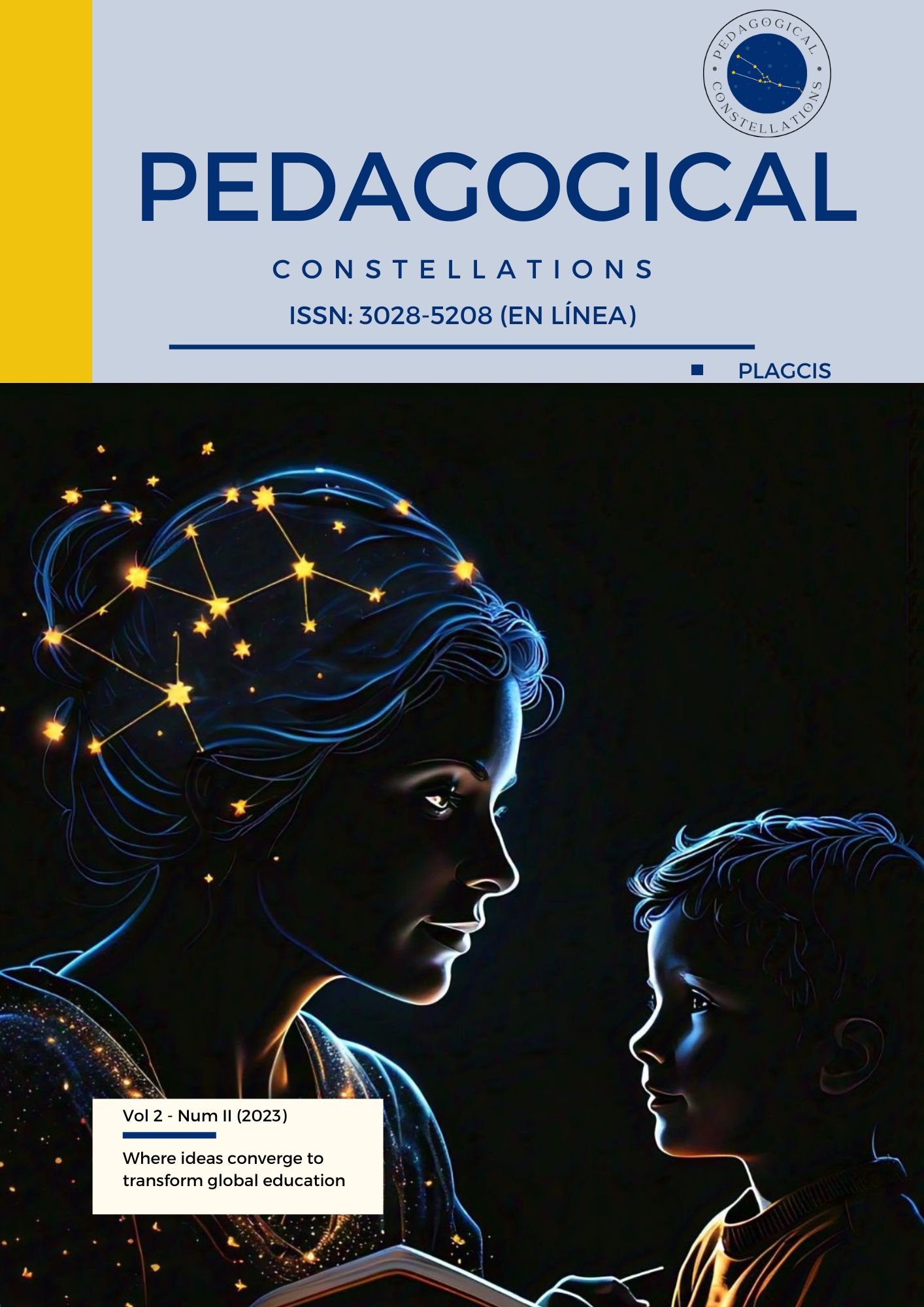Diagnosis of training needs in playful strategies for teaching reading in primary education
DOI:
https://doi.org/10.69821/constellations.v2i2.26Keywords:
Playful strategies, teacher training, reading instruction, primary education, educational diagnosisAbstract
Teaching reading in primary education faces significant challenges, especially in resource-limited contexts such as the Maritza Mena de Pérez State Primary School. This study aimed to diagnose the training needs of teachers in the use of playful strategies to strengthen reading instruction. A quantitative approach was used under a field design, applying a structured questionnaire to the 15 teachers at the school. The results revealed that more than 70% of the teachers lack training in playful strategies, although 86.7% recognize their effectiveness and 93.3% are interested in receiving additional training. However, 66.7% face difficulties in implementing these strategies, mainly due to a lack of resources. It is concluded that there is an urgent need to develop continuous training programs that equip teachers with the skills to use playful strategies, as well as to provide the necessary resources for their effective implementation in the classroom.
Downloads
References
Barboza, J. (2002). La enseñanza de la lectura en América Latina: Desafíos y propuestas. Editorial Universidad.
Candela, G., & Benavides, A. (2020). Actividades lúdicas en la enseñanza: Un enfoque motivacional. Editorial Educativa.
Carretero-Dios, H., & Pérez-Fabello, M. (2007). Formación docente: Un enfoque integral para el desarrollo profesional. Psicología Educativa.
Jiménez, A., & Sánchez, L. (2019). La importancia de la capacitación continua en la enseñanza primaria. Revista de Educación.
Jumbo, R. (2018). El juego como herramienta pedagógica en la enseñanza de la lectura. Revista de Innovación Educativa, 15(2), 45-58.
Loza, A. (2018). Procesos de lectoescritura y estrategias pedagógicas innovadoras. Revista Latinoamericana de Educación, 20(1), 89-104.
McClelland, D. C. (1961). The Achieving Society. Princeton, NJ: Van Nostrand.
Mendoza, R. (2018). El aprendizaje basado en el constructivismo: Implicaciones para la enseñanza. Revista Pedagógica.
Orellana, C. (2018). Analfabetismo funcional y su impacto en América Latina. Revista de Estudios Educativos, 12(3), 23-37.
Parra, J. (2020). Actividades lúdicas como estrategias de transición educativa en primaria. Revista de Educación Inicial, 8(2), 34-52.
Piaget, J. (1968). The Psychology of the Child. New York: Basic Books.
Quintanilla, P. (2021). Estrategias lúdicas para la enseñanza de la matemática en primaria. Revista Venezolana de Investigación Educativa, 14(1), 15-32.
Román Acosta, D. (2023). Aplicación de la inteligencia artificial en la investigación académica: caso ChatGPT. Finanzas Y Negocios, 3(2), 41-61. http://revistas.ulatina.edu.pa/index.php/Finanzasynegocios/article/view/323
Román Santana, W. M., López, L. del C., y Román Acosta, D. (2023). Potencialidades de América Latina en el sector turístico. Negonotas Docentes, 21, 57-69. https://revistas.cun.edu.co/index.php/negonotas/article/view/950
Roman-Acosta, D. y Barón Velandia, B. (2023). Del conocimiento individual a la sinergia colectiva: potenciando la colaboración en las redes de investigación. Revista Estrategia y Gestión Universitaria, 11 (2), 221-251. https://doi.org/10.5281/zenodo.10085278
Roman-Acosta, D., Caira-Tovar, N., Rodríguez-Torres, E., & Pérez Gamboa, A. J. (2023). Effective leadership and communication strategies in disadvantaged contexts in the digital age. Salud, Ciencia Y Tecnología - Serie De Conferencias, 2, 532. https://doi.org/10.56294/sctconf2023532
UNESCO. (2017). Informe sobre la alfabetización mundial. Organización de las Naciones Unidas para la Educación, la Ciencia y la Cultura.
Vygotsky, L. S. (2008). Imagination and Creativity in Childhood. Journal of Russian and East European Psychology, 47(1), 7-21.
Downloads
Published
Issue
Section
License
Copyright (c) 2023 Mariluz López, Fidelia Geraldina Carias (Autor/a)

This work is licensed under a Creative Commons Attribution 4.0 International License.
Authors who publish with this journal agree to the following terms:
- Authors retain copyright and grant the journal right of first publication with the work simultaneously licensed under a Creative Commons Attribution License 4.0 that allows others to share the work with an acknowledgement of the work's authorship and initial publication in this journal.
- Authors are able to enter into separate, additional contractual arrangements for the non-exclusive distribution of the journal's published version of the work (e.g., post it to an institutional repository or publish it in a book), with an acknowledgement of its initial publication in this journal.
- Authors are permitted and encouraged to post their work online (e.g., in institutional repositories or on their website) prior to and during the submission process, as it can lead to productive exchanges, as well as earlier and greater citation of published work.




